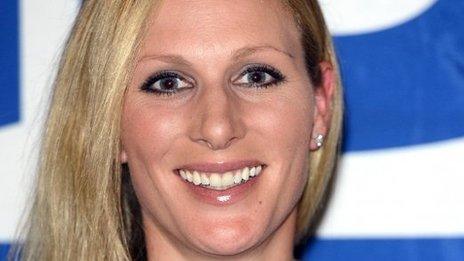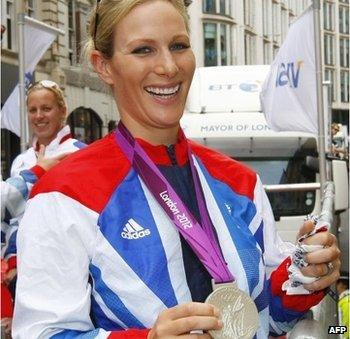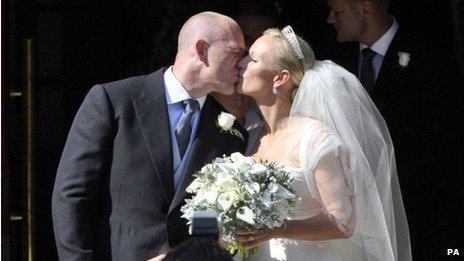Zara Tindall - a royal without rank
- Published

Zara's parents did not give her a royal title when she was born in 1981
Zara Tindall has given birth to a girl, the Queen's fourth great-grandchild.
And while Zara is the grand-daughter of the monarch, niece of the next king and cousin to the king after that - she is not someone of royal rank.
She is of course, part of the family that is royal and which we know as the Windsors - even though in her case she took the surname of her father, Capt Mark Phillips, the cavalry officer whom Princess Anne married at Westminster Abbey in November 1973 (and from whom she separated in August 1989).
But as the child of a daughter of the monarch, Zara was never entitled to the rank of "Her Royal Highness". At the time of her birth in 1981 much was made of the fact that her parents had declined to give their daughter a title (just as they had when Zara's elder brother, Peter, the Queen's first grandchild, was born in 1977).
But formal royal rank was never offered for the simple reason that under the ancient and, many may feel, somewhat arcane or even outdated customs and practices of the British royal family, being the child of a daughter simply doesn't automatically cut the mustard when it comes to royal styles and titles.
Champion horse-rider
In the case of the daughter of the famously no-nonsense Princess Anne, (or "Princess Royal" as she became in June 1987), Zara Tindall probably regarded her relatively unencumbered status as a considerable asset and advantage.

Zara Tindall won a silver medal at the 2012 London Olympics
It allowed her to get on with her life with a degree of freedom that a good many of her cousins must often have envied.
Both Zara's parents were champion horse riders: the Princess Royal competed in the British three-day-event team at the Montreal Olympics in 1976; Capt Phillips had competed in the same event at the Munich Olympics four years earlier and had been a member of the team which won the World Championship for Britain in 1970.
Little surprise then, when Zara started to show the same passion for equestrian sport and demonstrated that she had her parents' aptitude for it, that another champion began to take shape.
She was helped, of course, by the ready availability of advice and support from her family and she had access to the horses and training grounds without which it would have been very much more difficult to translate a natural ability into a world-beating skill.
But Zara showed that she had her mother's single-minded focus and determination to prove herself at the very highest levels of equestrian competition.
It culminated in the silver medal which she won with the other members of the British three-day event team at the London Olympics in 2012 - a victory which brought joy to her parents and grandparents.
Rugby player husband
Zara Tindall has navigated a careful path. She's the least royal of the Queen's grand-daughters. Compare her, for example, to Prince Andrew's daughters, Princesses Beatrice and Eugenie, both of whom do have royal rank as children of the son of a monarch.

Zara Phillips married rugby player Mike Tindall in Edinburgh in 2011
Neither of them has yet fully resolved the challenging dilemma of what you do with your life when you're a princess and a "Her Royal Highness" at a time when there's no great demand for you to be a full-time functioning younger royal.
Zara hasn't always got it right. There have been moments when her critics would say she's been too attracted to the blandishments of the commercial world or the trappings of the celebrity magazine circuit. Such temptations are never far from someone with her family pedigree.
There were also some well-publicised ups and downs in her earlier romantic life - but given her forthright personality and her unsolicited newsworthiness, who could have imagined that it would be otherwise?
In the summer of 2011 she married the former England rugby player Mike Tindall. He's certainly not the archetypal royal bridegroom or husband but then Zara has never wanted, or needed, to conform fully to whatever it might be that's expected of a grand-daughter of the Queen.
And that, almost certainly, has been the secret of both her success and her happiness.
- Published24 July 2013
- Published8 July 2013
- Published30 July 2011